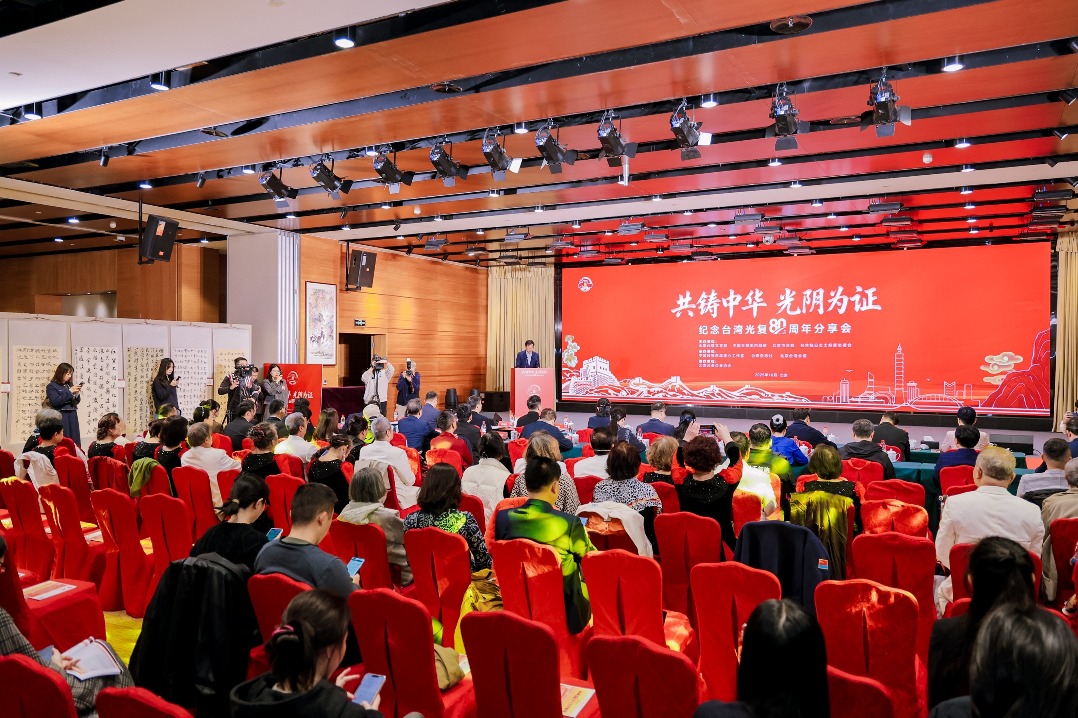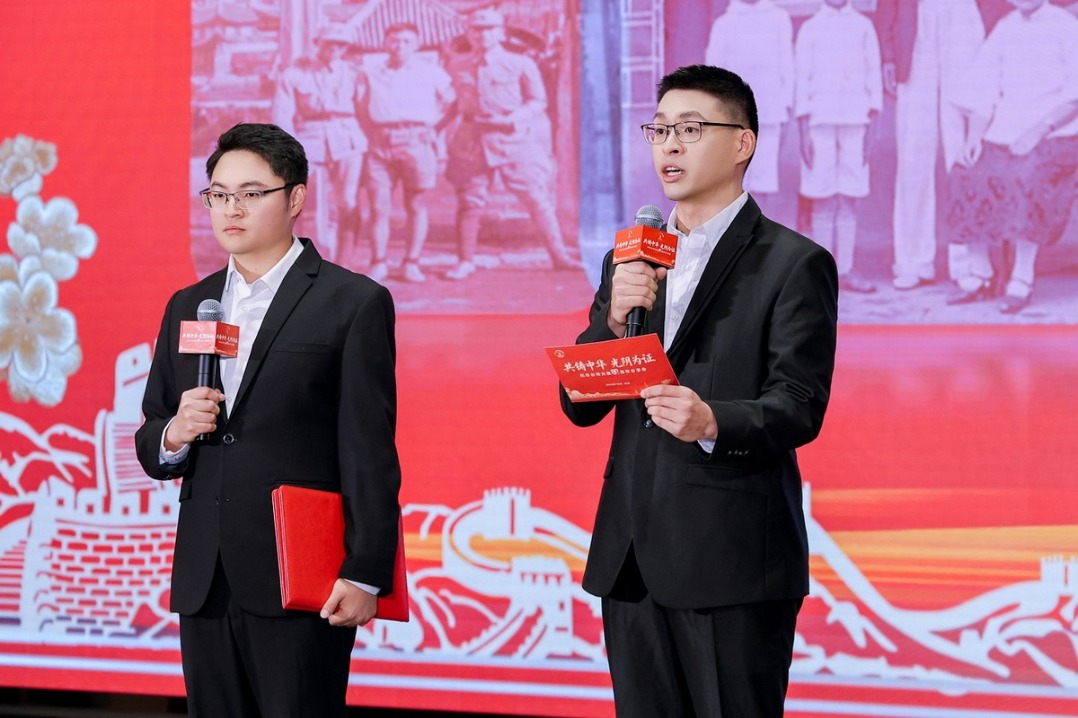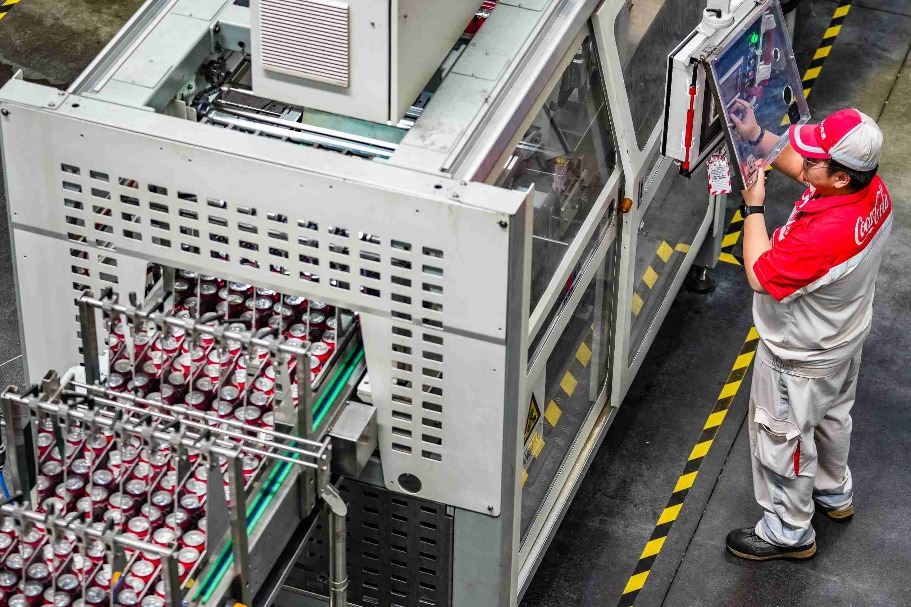Shandong county customizes approach to elderly care
Mountainous Yiyuan serves its seniors across all 446 of its villages

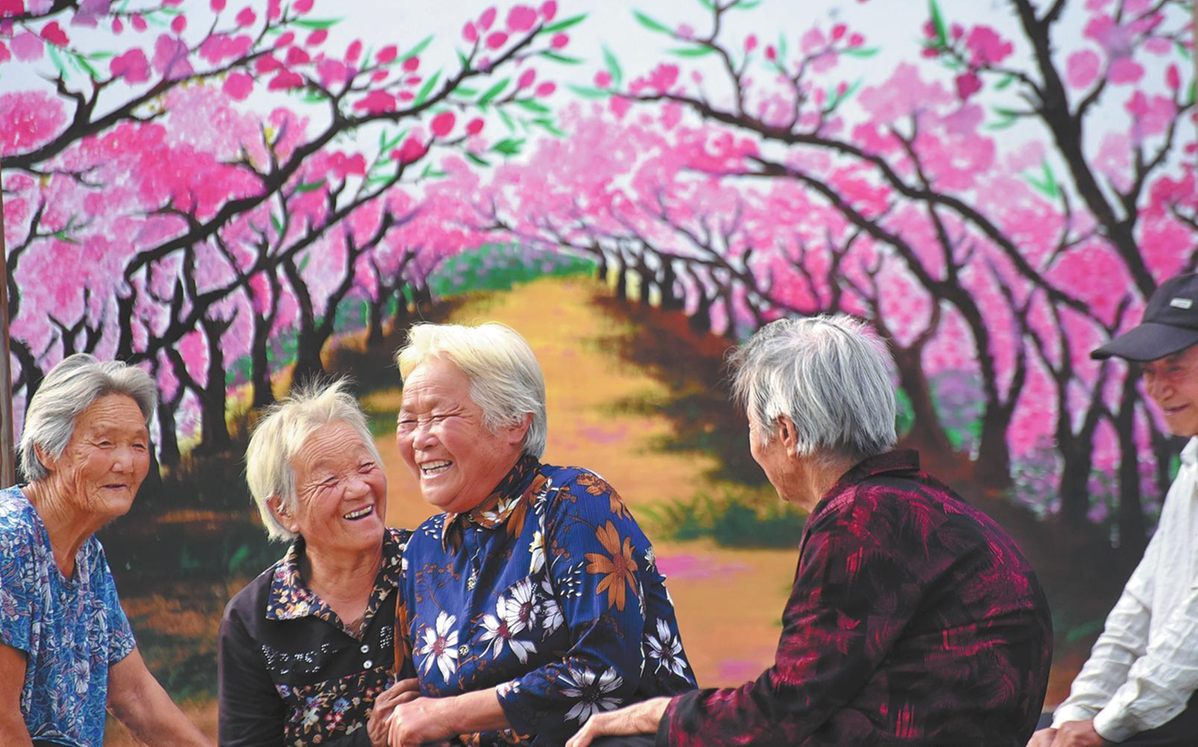
At a small community canteen in the village of Houjiaguanzhuang, tucked away in the mountainous county of Yiyuan in Shandong province, a group of elderly residents gather for their lunchtime meal.
On the menu is braised cabbage with pork and vermicelli, stir-fried shredded potato, millet porridge and steamed buns, all served by red-vested volunteers for the bargain price of just 1 yuan (14 cents).
Many older adults in China live alone and may face difficulty with preparing meals, daily care and health services.
The canteen is one of some 230 "Yiyuanhong" livelihood complexes that have been set up in many remote villages and towns in Yiyuan county to serve its elderly residents.
Yiyuan's large aging population and rugged mountain geography make it a prime example of the challenges facing the nation.
Of the county's 515,000 residents, 26 percent are 60 or above, higher than the national average. In rural areas, 85,000 elderly residents make up 33.7 percent of the rural population.
Launched in 2021, the Yiyuanhong model for elderly care seeks to address the needs of its aging population through a grassroots network of care centers and targeted services.
Enjoying her lunch, 87-year-old Hou Xianhua said having meals prepared for her daily has relieved a burden for her.
"Everything's cooked soft and lightly seasoned, they know our teeth aren't as strong as they used to be," Hou said.
"When I was young, working hard in the fields, I never imagined I'd see days like this," she added.
The canteen serves 70 to 80 seniors from the village daily.
Zhuang Benzhen, Houjiaguanzhuang Party secretary, said an integrated funding model has made the Yiyuanhong model possible.
"The county, the town and the village each contribute to subsidize the meals, keeping the costs to the elderly very low," he said.
For Houjiaguanzhuang, its portion of the funding comes from its 33 hectares of apple orchards.
Many of the elderly villagers, unable to work their farmland, have transferred their land-use rights to a cooperative run by the village Party that now manages the land.
"At the orchard, we've planted new tree varieties that have higher yields," said Zhuang, adding that the profits from the orchard cover most of the care center's operating costs.
Houjiaguanzhuang is one of 446 villages in Yiyuan, a rugged county with over 99 percent hilly terrain. Its main industry is agriculture, specializing in apples, peaches and cherries.
The Yiyuanhong model focuses on "farming for farmers and caring for the elderly", Zhuang said, noting that the county has turned the dual challenges of elderly care and farmland abandonment into an opportunity.
Yiyuan's 230 livelihood complexes and 168 food assistance stations are helping to improve both the county's senior care and sustainable land use.
Solutions in action
Party secretary of Yiyuan county, Zhang Tao, said pressing questions from the people are what drove the creation of the Yiyuanhong project.
"What happens when elderly villagers eat the same meal all day, or even for two or three days?
"How can aging farmers tend their orchards when they can no longer work the land?
"Who will help them shop or see a doctor when they live alone?"
To address the urgent concerns of these seniors, officials conducted door-to-door surveys across every village, eight times, before launching the project.
Spreadsheets at the county civil affairs bureau frequently highlighted questions related to advanced age and isolated elders.
These groups faced hardships such as irregular meals, untreated illnesses and farmland they could no longer maintain.
After three months of surveys, county officials concluded the four core needs of meals, medical care, bathing and shopping.
To meet these needs, the county began repurposing abandoned properties.
Vacant halls, collectively owned buildings and unused homesteads were transformed into livelihood complexes.
In Longziyu village, a complex was developed around the village Party office and the old cultural halls with a canteen, bathing room, clinic, hairdresser and leisure center.
The village has a population of 649, with 191 aged 60 and above.
"I used to wait until my hair was too long before going to town for a haircut," said Dong Jiyun, 66, touching her freshly trimmed hair. "Now I can get a cut anytime — right at my doorstep."
Once a week, doctors from the county traditional Chinese medicine hospital visit Longziyu to provide free acupuncture and blood pressure checks for the villagers.
Efficient operation
In Yihetou village's canteen stock room, sacks of rice and flour are neatly arranged alongside fresh vegetables such as winter melon, cabbage and potatoes. Each item is labeled with the recipient's name, product details, quantity and sorting date.
This supply comes from the county's centralized procurement center located in the urban area of Yiyuan.
Canteen staff place delivery orders via their smartphones to order the food they need.
Behind this operation lies a sophisticated logistics network that works through the night. At 1 am, the procurement center is brightly lit as workers inspect and sort fresh meat, while newly arrived vegetables from local farms are tagged and packed into crates.
By 7 am, these ingredients are loaded onto trucks destined for the central kitchen, also in the urban area, for preliminary processing. At the central kitchen, steamed buns, prewashed and precut vegetables are prepared to be sent out to the canteens.
Operated by Shandong Luzhong Food Supply Chain Co, a county government-supported enterprise, the system ensures that the final stage of cooking is simple.
"We provide food such as washed vegetables to village canteens, which only need to do the final cooking. This significantly reduces labor while maintaining food quality," said Li Xuebin, deputy general manager of Luzhong.
The food supply model connects local farms, processing facilities and elderly care centers, he said.
"We've created over 300 local jobs through this supply chain," said Li. "The standardized meal production has expanded beyond senior care, and now also serves local schools and government offices while contributing to the regional economy through public sales of surplus products."
Sustainable development
By using a tiered meal subsidy program, county, town and village-level authorities can cover at least 80 percent of meal costs.
The subsidy program represents more than just welfare; it's part of a carefully engineered ecosystem where each village's unique economic activities directly support its aging population.
The sustainability of this approach lies in Yiyuan's "one village, one industry" strategy.
"We've moved beyond simple subsidies to create systems where each community develops its own economic engine to support elderly services," said Zheng Jian, deputy Party secretary of Yiyuan.
This philosophy has produced remarkable adaptations across the county's varied terrain, he added.
In the mountainous Shuimetouhenan village, where poor soil once thwarted traditional farming, this challenge has been turned into an opportunity.
"Using poverty alleviation funds and loans, in 2016 we invested millions to become early adopters of photovoltaic energy," said Cui Xueliang, Party secretary of Shuimetouhenan.
By organizing some barren land, Cui introduced three enterprises to build production facilities in the village. These enterprises produce several agricultural goods, including dried vegetables and fruit-based products.
Today, solar panels on hillsides and rooftops generate some 520,000 yuan in income annually for the village, creating a stable funding source for elderly care services.
In Dongan village, fragmented small plots have been consolidated into a thriving 13 hectares of modern grape vineyards.
"Previously, our elders struggled to farm these scattered plots with low yields," said Geng Wei, the village Party secretary.
"Now the vineyards not only solve their farming difficulties but contribute 120,000 yuan yearly to our collective funds," he said.
Perhaps most remarkably, Yiyuan county's elderly aren't just beneficiaries but active participants in this transformation. In Yihenan village, when initial resistance threatened a kiwi fruit plantation, elderly residents like Zhang Xiangmei and Liu Wenmei became its strongest advocates.
"These projects ultimately support our care and we should back him (the village Party secretary)," they persuaded their children and neighbors.
Their endorsement helped Xu Hongliang, the village Party secretary, convince residents to pool land-use rights, leading to a successful 13-hectare plantation that promises further expansion.
Zhang Xiangmei and Liu Wenmei share a 25-square-meter living room at the village's livelihood complex. Every day, they eat at the village's canteen and chat with their fellow villagers.
"Living together with other seniors they know, the elderly can help each other and have a small chat every day, which keeps them in a good mood," said Xu.
A total of 1,308 industry projects have been implemented county-wide, and all 446 villages have achieved annual incomes exceeding 100,000 yuan, with half of the villages surpassing 200,000 yuan. The economic foundation ensures the steady operation of elderly care services.
Behind this model stands the village Party secretaries.
"Village Party secretaries are the 'CEOs' of rural vitalization, who master both governance and entrepreneurship," said county Party secretary Zhang.
"We must train them to be dedicated, capable and responsible leaders," he said.
This year, the county has trained 1,220 rural "CEOs", including both village Party secretaries and farming experts who have consolidated 400 hectares of farmland, and launched 45 agricultural projects, generating 3 million yuan in total collective income.
Zhang attributes their success to "people-centered governance and the integration of human rights protection into every policy".
"It's not just about building the facilities or handing out money. The mechanism has to take root and thrive," he said.
Zheng Lihui contributed to this story.
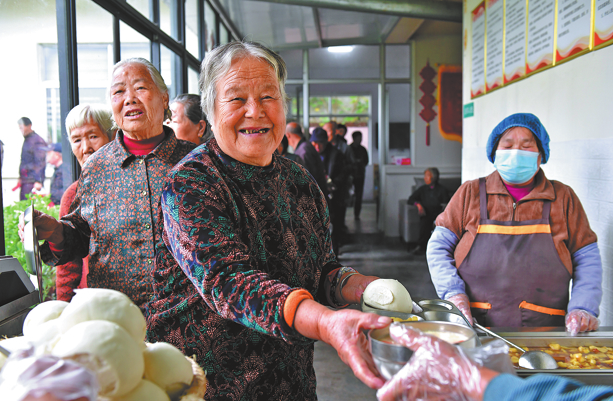
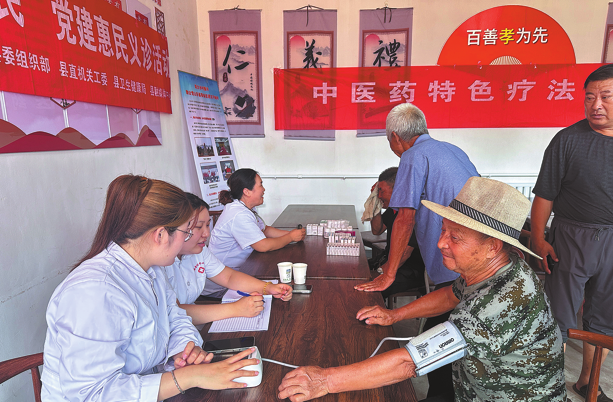
Today's Top News
- China-EU dialogue aims to manage differences
- Rising tariffs set to threaten medical sector
- Airbus launches 2nd Tianjin assembly line
- Plenum doubles down on opening-up to deepen engagement with the world
- Talks rational means to settle differences
- Mainland to enhance exchanges with all political entities in Taiwan

















